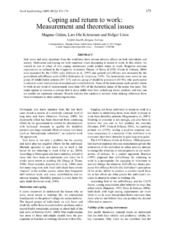| dc.contributor.author | Kristensen, Lars Ole | eng |
| dc.contributor.author | Odeen, Magnus | eng |
| dc.contributor.author | Ursin, Holger | eng |
| dc.date.accessioned | 2011-10-13T12:10:28Z | |
| dc.date.accessioned | 2020-12-10T06:27:08Z | |
| dc.date.available | 2011-10-13T12:10:28Z | |
| dc.date.available | 2020-12-10T06:27:08Z | |
| dc.date.issued | 2009 | eng |
| dc.identifier.citation | Norsk Epidemiologi 19 (2): 173-178 | nob |
| dc.identifier.issn | 0803-2491 | |
| dc.identifier.uri | https://hdl.handle.net/1956/5090 | |
| dc.description.abstract | Sick leave and early departure from the workforce have serious adverse effects on both individuals and society. Motivation and coping are both important when attempting to return to work. In this article, we wanted to test if either of two coping instruments could predict return to work. Response outcome expectancies as defined in the Cognitive Activation Theory of Stress (CATS) (Ursin & Eriksen, 2004) were measured by the CODE scale (Eriksen et al., 1997) and general self-efficacy was measured by the generalized self-efficacy scale (GSE) (Schwarzer & Jerusalem, 1995). The instruments were tested in one group of rehabilitation patients (N= 135) and one group of disability pensioners (N=85), who participated in return to work interventions in randomised controlled trials. None of the instruments could predict return to work at any point of measurement. Less than 10% of the theoretical range of the scales was used. The scales appear to measure a concept that is more stable than their underlying theory predicts, and they can not predict an important outcome. Results indicate that caution is advised when making inferences from these instruments to their underlying theories. | en_US |
| dc.language.iso | eng | eng |
| dc.publisher | Norsk Epidemiologi | eng |
| dc.rights | Attribution 3.0 Unported (CC BY 3.0) | eng |
| dc.rights.uri | http://creativecommons.org/licenses/by/3.0/ | eng |
| dc.subject | Sick leave | eng |
| dc.subject | Coping | eng |
| dc.title | Coping and return to work: Measurement and theoretical issues | eng |
| dc.type | Journal article | eng |
| dc.type | Peer reviewed | eng |
| dc.rights.holder | Uni Health | eng |
| dc.description.version | publishedVersion | |
| dc.subject.nsi | VDP::Social science: 200::Psychology: 260::Organizational psychology: 268 | eng |
| dc.subject.nsi | VDP::Social science: 200::Psychology: 260::Cognitive psychology: 267 | eng |

